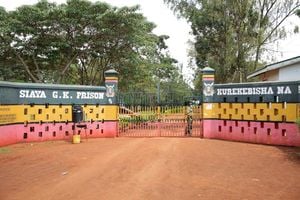How ‘eating’ Christmas and New Year upcountry breeds revolution

A child rides an electronic toy car at Thompson Falls in Nyahururu, Laikipia County, on Christmas day, December 25,2019. PHOTO | JOSEPH KURIA | NATION MEDIA GROUP
What you need to know:
- The flyover will eventually be built, but it is what will follow that will probably have a greater impact on politics.
- For starters, we know the type of people who weren’t in Uhuru Park over the holidays.
- They were the “1 per cent” and the middle class with some money.
This is a period of recession for traditional opposition politics and Africa.
But don’t despair, there is hope — though in very unlikely places. Let’s begin in Kenya.
UNPAID JOY
There were some dramatic photographs of Kenyan masses celebrating Christmas and the New Year in Nairobi’s Uhuru Park.
Uhuru Park has been in the news lately as environmentalists and extreme “modernists” squared off over government plans to build a flyover through it. Several social media users, referencing the crowded Uhuru Park, said that it made the case against the flyover as it would kill off one of the few sources of unpaid joy for Nairobians.
The flyover will eventually be built, but it is what will follow that will probably have a greater impact on politics.
For starters, we know the type of people who weren’t in Uhuru Park over the holidays. They were the “1 per cent” and the middle class with some money.
Those were away holidaying in South Africa, the luxury spots in the rest of East Africa, the Bahamas, or chilling in their country homes with other relatives who had returned, as the Ugandans would say, “from outside countries”.
POLITICAL ACTION
Many of those folks in Uhuru Park were the ones left behind, the stranded ones, who couldn’t afford to holiday away from Nairobi where they scrounge a living. They came to Uhuru Park for the warmth of community, and a fellowship with others like them, without having to pay an entry for the privilege.
But they must have been aware from the near-empty suburbs and the thinned-out traffic that they had been left behind.
In the years to come, with the flyover darkening their view, and with all the rubbish that comes with highways in Africa, that is when they will really hurt, and think of taking political action. But not yet.
But perhaps even radicalising, are the many people who leave the cities in droves to go “to the village” for Christmas and New Year.
It leads to a series of events that highlight inequality for upcountry communities in simple but vivid ways that political campaigning and journalism perhaps don’t.
ROADSIDE MARKETS
One of the things that happen when the city people arrive is that the roadside markets and shopping centres just don’t have enough change to give them back for their purchases, and mobile money agents don’t have enough float for their requests.
They will buy a carton of mineral water. It’s a sale the shopkeeper hasn’t made all year, but then he has a problem — he can’t find change of Sh900.
You buy a basket of cheap tomatoes for Sh250 and give the ‘Mama Mboga’ Sh1,000. She is in trouble. Usually, she sells to fellows who give her Sh25 or Sh50 for two or so tomatoes; now you bring your Sh1,000 in the picture.
Out in the villages, we stretch out and walk about in our shorts, sunglasses, sun hats, and even Chinese fans to ward off the heat. Our feet are oiled and shiny.
The chaps in the village walk about in shorts, too, but out of necessity, not choice. They can’t afford trousers. And their legs are dusty, and perhaps not as prosperous-looking as those of the city people.
CAKE SWEETNESS
Local church collections skyrocket. Where a church usually collects Sh15,000, with a few Christmas and New Year returnees in attendance it can soar to Sh150,000.
God is happy but the people also read it as a statement about the paucity of their circumstances.
We were at a big Christmas party, complete with cake. That is as it should be. Neighbours were invited to the feast.
I learnt that a nice lady in the community had said she would be content to eat the icing on the cake — the bit most health-conscious city folk don’t eat. She needed the big kick of sweetness to bring joy to a year of struggle.
Before long, these inequalities that go down to what we dare imagine and dream of will catch up.
The most radicalising thing that is happening in our politics could be what the urban people take upcountry over Christmas and New Year. An economist friend speculated — drunkenly — that it might even drive rural-urban migration.
BAN CELEBRATIONS
A political class worried about future revolution might do well to ban Christmas and New Year. The quandary is that those are, perhaps, the two things they can’t ban.
Mr Onyango-Obbo is curator of the Wall of Great Africans and publisher of explainer site Roguechiefs.com. @cobbo3





